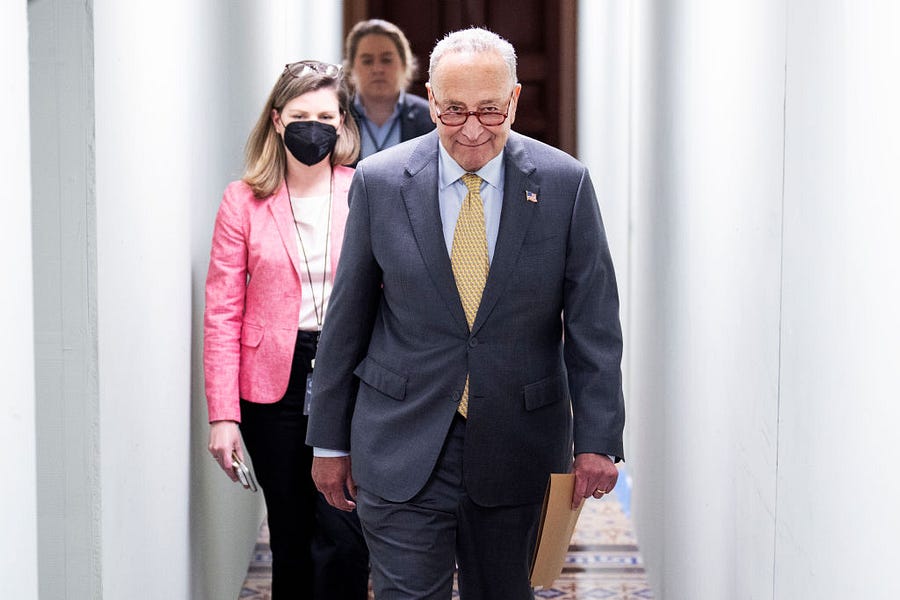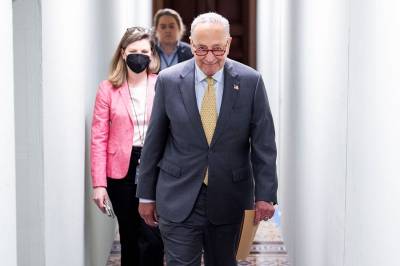Buzzing listlessly around Washington this week like an overfed mosquito is the idea of reviving what was once called the “human infrastructure” bill, which was then euphemized as Build Back Better, and is now the legislation with no name.
My favorite description of the suite of social welfare and environmental spending came from Politico, which referred to it as Democrats’ “signature spending bill,” as if it were describing an appetizer at Chili’s. The Washington Post was more utilitarian with “a staple element.” Like nitrogen? The Associated Press came close to using the naughty phrase, calling the legislation “a scaled-back version of the economic package that collapsed last year,” but never used the triple-b words.
So what is this thing that Democrats are said to be desperate to pass to “reshape their political fortunes” as “a remedy for a campaign season that so far looks bleak,” and why did “party leaders [take] special care to distance their legislative work even from the name Build Back Better?”
The legislation, whatever you call it now, got shelved before Christmas when Sen. Joe Manchin of West Virginia pulled out of negotiations. The House passed a $1.6 trillion version in November, despite much desperate anger from progressives. The plan originated with Senate Budget Committee Chairman Bernie Sanders’ $7 trillion version, but got cut in half twice as President Biden kept pursuing Manchin and fellow moderate Democrat, Kyrsten Sinema of Arizona, in search of what we were always being told was a “much-needed win.”
After weeks of pressure from Biden, Sanders, and climate activists, Manchin walked away from the negotiating table on December 18, effectively killing the bill. Manchin affirmed its death in February and again in April. He set the tone for his party with this comment: “What Build Back Better bill?,” he said. “It’s dead.” The message today from Majority Leader Chuck Schumer: Build Back Better is dead. Long live Build Back Better.
The party line is that the “climate and tax agenda” will “consume” the remaining four weeks until the chamber’s August recess. Here’s WaPo: “So far, top Democrats have worked out with Manchin new agreements that would cut drug costs for seniors, improve the financial health of Medicare and close a tax loophole that benefits the wealthy. They even have advanced talks around addressing the challenges posed by a faster-warming planet, raising the prospect that they can secure a limited initiative to penalize methane emissions.”
It sounds like what Manchin is hoping for is $500 billion in spending, including $200 billion in Obamacare subsidies set to expire this year under a previous piece of fiscal bait and switching. Manchin reportedly wants an additional half-trillion dollars projected to be generated over a decade by new prescription drug rules for Medicare and the elimination of a tax break for top earners to go toward deficit reduction.
If one had proposed this to Sanders and the progressives a year ago, it would have been treated as a preposterous joke. But, Manchin has certainly proven that he can take the heat when it comes to blocking bills and, more importantly, Democrats know that they are certain to lose the House this fall, and quite possibly the Senate. This is probably the last stop before electoral oblivion. The trip from $7 trillion to $500 billion was faster and more complete than the progressives could have imagined when they were haughtily holding up a very popular infrastructure infrastructure bill last summer to gain leverage on passing what is now the bill that dare not speak its name.
Lolz.
I am sure that there are some Democrats who believe that the passage of not-Build Back Better will be restorative to their electoral chances—if only as a matter of wishcasting. When you are down, everything seems like a way back up. But this package looks like it has a lot more to do with a last gasp of a majority, primary vulnerabilities, and the busywork of bored legislators than it does with an electoral revival.
There are reasons for Democrats to hope that they might hold the Senate and that their beating in the House would be in the normal zone of a midterm like this one. Republicans are a mess and on their way to picking a bunch of very risky Senate and gubernatorial nominees, and the Dobbs decision will stiffen the spine of Democrats who were preparing to shun moderate Senate nominees in the name of purity and pique.
If the most likely outcome today is Republicans gaining 30 or so seats in the House and winning a 53-seat majority in the Senate, there’s certainly reason for Democrats to think they can cut the House losses by a third and cling to a Senate majority.
But it sure as shooting won’t be because of a legislative package they’re ashamed to name.







Please note that we at The Dispatch hold ourselves, our work, and our commenters to a higher standard than other places on the internet. We welcome comments that foster genuine debate or discussion—including comments critical of us or our work—but responses that include ad hominem attacks on fellow Dispatch members or are intended to stoke fear and anger may be moderated.
With your membership, you only have the ability to comment on The Morning Dispatch articles. Consider upgrading to join the conversation everywhere.